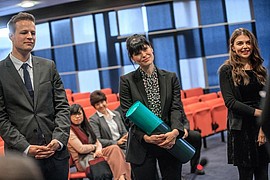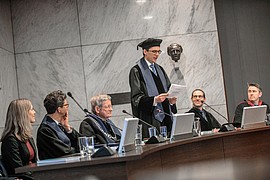PhD Defence: Christilene du Plessis

In her dissertation ‘INFLUENCERS: The Role of Social Influence in Marketing’ ERIM’s Christilene du Plessis challenges common methodological conventions used to study social influence in consumer behavior and social psychology.
Christilene defended her dissertation in the Senate Hall at Erasmus University Rotterdam on Thursday, 14 December 2017 at 11:30. Her supervisors were Prof. Stefano Puntoni and Prof. Steven Sweldens. Other members of the Doctoral Committee are Prof. Andrew Stephen (Saïd Business School), David Dubois (INSEAD), Dr Gabriele Paolacci (RSM).
About Christilene du Plessis

Christilene du Plessis was born in Phalaborwa, South Africa on March 31, 1986. She received her Bachelor’s degrees in Science (majors in physiology and biomedical science) and Business Management (major in marketing) from the University of Queensland. She received her Honor’s degree (first class) in Business Management from the University of Queensland, and her Master’s degree in Management from INSEAD. In 2014, she started her Ph.D research in Marketing at the Erasmus Research Institute in Management. Her main research interests concern social influence and how it shapes (and is shaped by) consumers and marketers in the context of digital marketing. Her work has been published in the Journal of Experimental Social Psychology and she has presented her research at numerous international conferences (e.g., the Association for Consumer Research, Society for Consumer Psychology, Society for Personality and Social Psychology, and European Marketing Academy conferences). Her work has won numerous awards, including the prestigious Best Dissertation Proposal Award by the Society for Consumer Psychology and the Best Student Paper Award by the International Association for Conflict Management. From October 2015 to March 2016, she was a visiting research scholar at the Johnson Graduate School of Management, Cornell University. In July 2017, Christilene started working as an Assistant Professor in Marketing at Singapore Management University.
Thesis Abstract

This dissertation challenges common methodological conventions used to study social influence in consumer behavior and social psychology. The first part of this dissertation moves beyond the study of social influence in a single dyadic relationship, and investigates how one dyadic relationship influences another. Here, influence attempts by one agent (e.g., a company) on another (e.g., a review writer) are shown to not only influence the cognitions of the agent being influenced, but also their ability to influence others (e.g., review readers). The second part investigates how the widespread use of 2-cell instead of 3-cell experimental designs in social power research limits understanding of both the powerful and powerless. The pervasive practice of contrasting high power to either a low power or a control condition is found to weaken construct validity and inflate the size of effects attributed to high power. In contrast, using 3-cell experimental designs facilitate theoretical advancement by enabling the identification of curvilinear effects. The findings in this dissertation highlight the need for scholars to question common methodological conventions used to study social influence. Overall, this research suggests that doing so may increase methodological rigor, confidence in observed effects, and may lead to novel theoretical insights.
Photos: Chris Gorzeman / Capital Images


